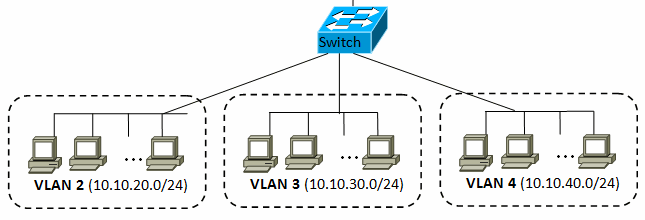Understanding the Physical Indicators
- System – System Status. As it powers on, it will blink green. Will turn solid green upon completion.
- RPS – Redundant Power Supply. If installed, this will glow green.
- STAT – Default Mode. Show status of port. On (flicker) with signal.
- Util – Utilization. All lights work together to show full traffic utilization.
- Duplex – Ports will like for all ports working in Full Duplex. Unlight ports will be half-duplex
- Speed – On for 100 Mbps, off for 10 Mbps
- Mode Button (Available on Stackable Switches) – This will switch between the Stat, Util, Duplex and Speed modes.
Observing the Boot Process
- No power button. Need to unplug/plug in to boot.
- Copies IOS from flash to RAM and decompresses it.
- Shows current version of IOS
- Tests each component, cpu, ram, etc.
- Memory: 65526k/8192K Bytes of Memory (Volitile / Non-Volitile)
- Memory is partitioned into 2 sections: for total memory, you add the two values together.
- After boot, system will continue to spew out messages. (Press Enter or Tab to see last question.
Performing the Initial Configuration
Basics
- Would you like to enter initial configuration mode (Setup Wizard): NO!! Ctrl+C to exit!
- Once you know how to do it from command line, you’ll prefer it.
- Enable Secret – Password to enter Privilege Mode.
- Enable Password –
- Basic Management – Just enough information to configure it remotely.
- Any option in [ Brackets ] is the default. Press Enter to accept.
- Virtual Terminal Password – Password for Telnet, even to access User Mode
Manual configuration
Initial Login is User Mode. Switch to Privilege Mode
Host>enable
Host#_
Switch to Global Configuration mode to make configuration changes
Host#configure terminal
Host(config)#_
Set the Hostname
Host#hostname Sw1
Sw1(config)#_
How to name a switch: Recommend Logical/physical location of switch.
Assign an IP Address – Requires basic understanding of vlans (Virtual LANs)
- VLANs break your switch into multiple broadcast domains.
- VLANs are not part of this series, is for CCNA.
- Broadcasts to VLAN1 will only go to ports on VLAN1, Broadcasts on VLAN2 only go to VLAN2, etc.
To Assign an IP, we need to enter a VLAN Interface.
- By Default, all ports are assigned to VLAN1
- Difference between VLAN1 and Interface VLAN1 (Virtual Interface)
- Interface VLAN1 is accessible by every switchport on VLAN1.
- Can Telnet and Ping the Virtual Port, even though it doesn’t actually exist.
- Once an IP is assigned to Interface VLAN!, you can log into the system.
Sw1(config)#interface vlan1 Sw1(config-if)#ip address 172.30.2.180 255.255.255.0 Sw1(config-if)#end Sw1#show interface vlan 1 vlan1 is administratively down, line protocol is down Hardware is Ether... internet address is 172.30.2.180/24 ...
Enable the Interface using “no shutdown”
Because the interface is down, we need to enable it.
Sw1#conf t Sw1(config)#int vlan 1 Sw1(config-if)#no shutdown
result…
%LINK-5-CHANGED: Interface Vlan1, changed state to up
At this time, the switch can be accessed via Telnet!
Assign a default gateway. This would be the IP address of the Router connected to the switch.
Sw1(config)#ip default-gateway 172.30.2.1
** Note: The Default Gateway is assigned GLOBALLY!! Regardless of the port, you only have 1 default gateway!
Saving your Configuration!
All configuration changes made are only stored in VOLITILE RAM! If the power is lost, all changes will also be lost!
Sw1#show running-config
Building configuration...
current configuration : 1020 bytes
!
version 12.1
no service timestamps log datetime msec
no service timestamps debug datetime msec
no service password-encryption
!
hostname Sw1
!
...
interface Vlan1
ip address 172.30.2.180 255.255.255.0
!
ip default-gateway 172.30.2.1
!
...
end
Sw1#_
To save the running configuration to the startup configuration:
Sw1#copy running-config startup-config Destination filename [startup-config]? Enter Building configuration... [OK] Sw1#
CAUTION!!
Make sure you only press Enter when prompted for the Destination filename! Entering Y or similar will change the filename to “Y”!!!
Verify the change –
Sw1#show running-config
Using 1020 bytes
!
version 12.1
no service timestamps log datetime msec
...
end
Sw1#_
Knowing Your Switch – Getting an Overview
Sw1#show version
Cisco Internetwork Operating System Software
IOS (tm) C2950 Software (C2950-I6Q4L2-M), Version 12.1(22)EA4, RELEASE SOFTWARE(fc1)
Copyright (c) 1986-2005 by cisco Systems, Inc.
...
